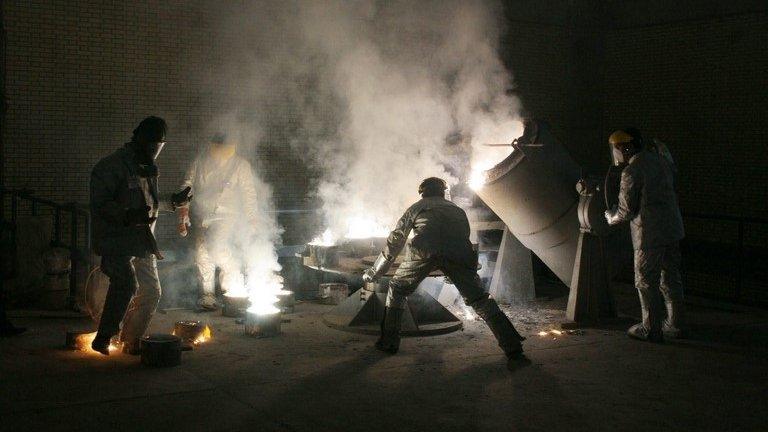Timeline: Iran and UK relations
- Published
The UK is set to reopen its embassy in Tehran in the coming days, almost four years after it was closed following the storming of the compound by protesters.
Relations with Iran have been shaky since the Islamic Revolution in 1979.
20 August 2015
The British embassy in Tehran is expected to be reopened within days, during a visit to Iran by Foreign Secretary Philip Hammond and a delegation of business leaders.
The move follows a deal agreed by Iran with six world powers on curbing its nuclear programme.
The reopening of the embassy was first publicly proposed by the UK government last year, but had been held up by problems including Iran's reluctance to relax import laws which slowed the replacement of equipment taken out when the post was abandoned.
17 June 2014
William Hague: "Iran does have the capability to play a more positive role across the region."
British Foreign Secretary William Hague says the circumstances are right to reopen Britain's embassy in the Iranian capital Tehran.
It follows an improvement in relations in recent months following the election of a more moderate president, Hassan Rouhani, in June 2013 and an agreement on how to deal with Iran's nuclear programme.
It also comes as Iraqi forces are engaged in heavy clashes with Sunni Islamist militants across the country, amid reports that Iran is providing military assistance to its historic rival.
30 November 2011
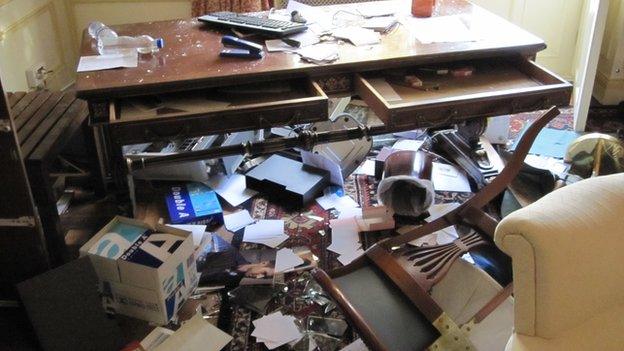
Britain demands the immediate closure of the Iranian embassy in London, saying also that all Iranian diplomats must leave the country within 48 hours. Foreign Secretary William Hague also reveals that all UK diplomatic employees have already left Iran.
29 November 2011
Protesters surround the British embassy compounds in Tehran
Iranian protesters storm the UK embassy in Tehran, throwing stones, petrol bombs, and burning documents. They attempt to occupy it before being dispersed by riot police. The UK Foreign Office says it is "outraged" by the incident.
27 November 2011
The Iranian parliament votes to expel the British ambassador in Tehran, Dominick Chilcott. Economic and trade links with the UK are weakened.
21 November 2011
British Chancellor George Osborne announces financial sanctions against Iran as a result of a report by the UN's nuclear watchdog, the International Atomic Energy Agency (IAEA), into its nuclear programme. Britain ceases all ties with Iranian banks.
November 2010
Four people said by Iran to be terrorists with links to Britain are arrested according to the country's English language television station Press TV.
The Foreign Office denied the men had ties to Britain and said this was "another in a long line of slurs against the United Kingdom from the government of Iran".
September 2009
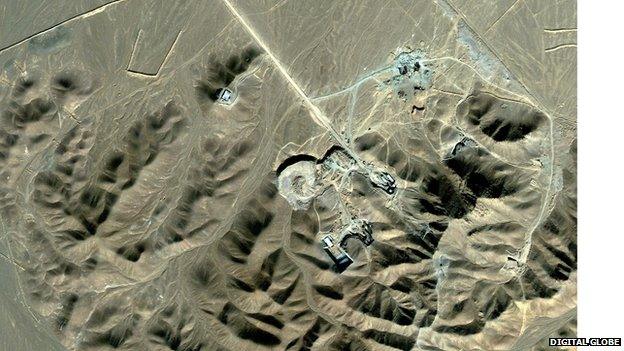
Iran admits it is building a uranium enrichment plant, external near Qom, but insists it is for peaceful purposes. British intelligence services played a key role in the unveiling of the site.
19 June 2009
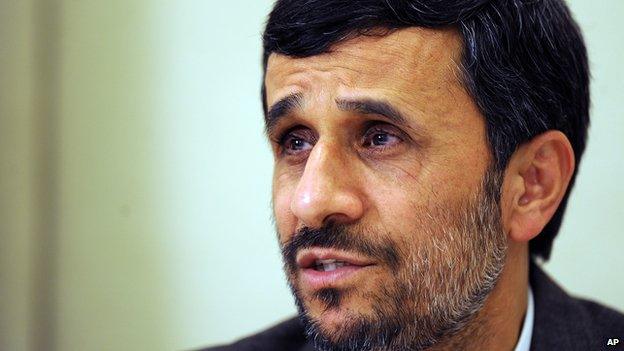
Mass protests are held after the re-election of President Mahmoud Ahmadinejad, external. The opposition says the election was fraud.
Iran's Supreme Leader Ayatollah Ali Khamenei says "arrogant powers" in the US and European countries tried to encourage protests. He adds that the "most evil of those powers was Britain". The British media was also criticised.
January 2009
The British Council, which has been operating intermittently in Iran since 1961, says it has suspended operations in Tehran, claiming Iranian officials "pressurised" their staff.
December 2008
President Mahmoud Ahmadinejad delivers Channel 4's alternative Christmas message, external to Britain.
July 2008
In a speech to the Israeli parliament,, external Gordon Brown says: "Iran has a clear choice to make: suspend its nuclear programme and accept our offer of negotiations or face growing isolation and the collective response not of one nation but of many nations."
March 2007
In March 2007 Ian Pannell reported from HMS Cornwall on the seizure of 15 British Royal Navy crew by Iran
Iran detains 15 British navy personnel, external who were patrolling the Shatt al-Arab waterway separating Iran and Iraq. Tehran says that the boat entered Iranian waters. A diplomatic row ensues and they are released on 4 April.
June 2004
The UK, Germany and France draft a resolution for the IAEA criticising Iran's lack of co-operation with inspections of its nuclear programme, external. Later in the month, eight British sailors are held for three days in Iran after their ship reportedly strays into Iranian waters near the border with Iraq.
May 2004
Demonstrations take place outside the UK embassy in Tehran, as people criticise the UK and US military for fighting near the Shia holy cities of Iraq.
September 2003
The IAEA reports for the first time on Iran's 18-year nuclear programme. Iran insists it is for civilian purposes only but some parts of the international community, particularly the US and UK, believe that Iran is intent on building a nuclear weapon.
In November 2003, Tehran agrees to more extensive inspection of its nuclear facilities by the IAEA.
February 2002
Iran rejects David Reddaway as the UK's ambassador , externalto Tehran, calling him a spy.
21 September 2001
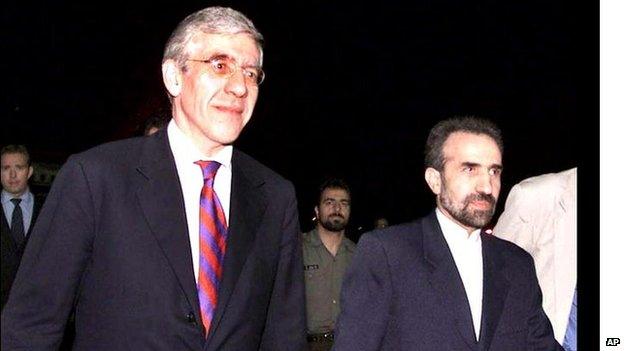
Jack Straw becomes the first UK foreign secretary to travel to Iran since the Islamic revolution, external. It is part of a wider effort to forge a coalition against the Afghan Taliban.
February 2001
Cabinet minister Mo Mowlam visits Iran, external and pledges UK assistance in Iran's fight against narco-trafficking from Afghanistan, which supplies 90% of the heroin sold in the UK.
1999
UK and Iran exchange ambassadors for the first time since the revolution in 1979.
September 1998

Relations with Britain are restored to ambassador level after Tehran officially distances itself from the Salman Rushdie affair whereby it called the British author's book the Satanic Verses blasphemous against Islam and said Muslims had a duty to kill Mr Rushdie.
It now says it would not carry out the fatwa nor encourage anyone else to do so.
1992
An Iranian diplomat is expelled in retaliation for Tehran's expulsion of a UK diplomat. Later, three Iranians are expelled from London (two embassy officials and a student) after an alleged plot to kill Mr Rushdie.
1991
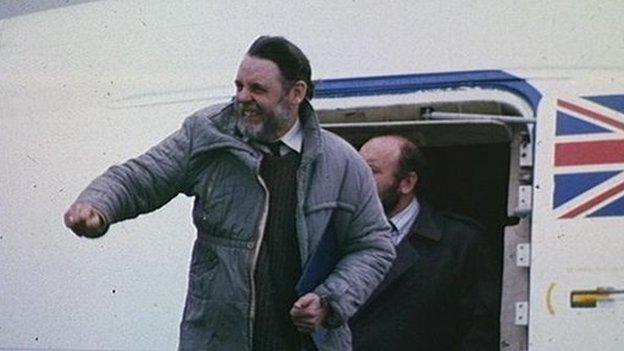
Diplomatic relations with the UK improve with the release of Terry Waite, who was held hostage by an Iranian-backed militant group in Lebanon for almost five years. Iran is perceived to have been instrumental in securing Mr Waite's release.
February 1989
Iran declares a fatwa on Mr Rushdie, external. Bilateral diplomatic ties are broken, and Mr Rushdie goes into hiding.
1988
British embassy in Tehran reopens.
30 April - 5 May 1980
SAS soldiers storm the Iranian embassy in London: May 1980
Six anti-Khomeini Iranian gunmen take over the Iranian embassy in London and take 22 people hostage. The siege ends when British special forces soldiers storm the building, killing five of the gunmen. Nineteen hostages are set free but one dies and two are injured after the gunmen open fire on them during the assault.
1979
Britain closes its embassy in Tehran, following the Islamic revolution, external.
1955
CENTO, the Central Treaty Organisation, is formed under the Baghdad Pact by the UK, Iran, Iraq, Pakistan and Turkey to offset Soviet influence in the region. Like Nato, it pledges mutual co-operation and non-interference in each others' internal affairs. The US joins the pact in 1958. CENTO is a largely symbolic body and disbands in 1979.
1953
Prime Minister Mohammed Mossadegh is ousted in a coup sponsored by US and British intelligence agencies. He serves a three year jail sentence for treason and spends the remainder of his life under house arrest until his death in 1967.
1950
Mossadegh is appointed prime minister after Ali Razamara is assassinated. In 1951 he tries to nationalise the British-owned Anglo-Iranian Oil Company, but Britain imposes an embargo and appeals to the US for help.
1941
Iran says it will remain neutral in World War II but Reza Shah, the first Pahlavi king, had also expanded trade and links with Nazi Germany in the 1930s.
Fearful of the outcome, especially after German incursion into the Soviet Union in 1941, the UK and Russia jointly occupy Iran and force Reza Shah to abdicate. He later dies in exile.
UK and Russian troops leave Iran in 1946 after US officials cite clauses in the 1942 Atlantic Charter prohibiting colonial expansion on the back of wartime efforts.
- Published27 November 2011
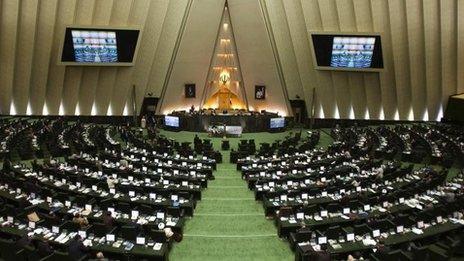
- Published22 November 2011
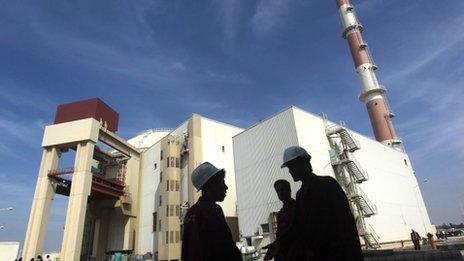
- Published18 November 2011
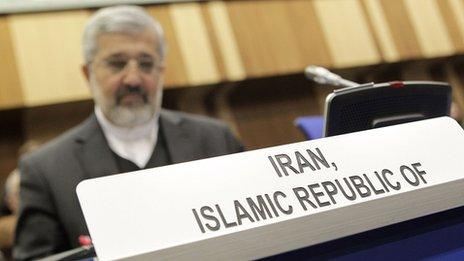
- Published25 November 2014
